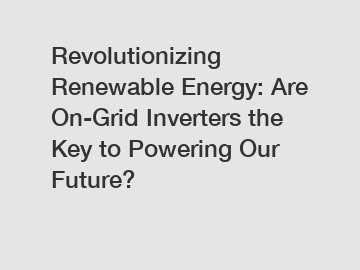Revolutionizing Renewable Energy: Are On-Grid Inverters the Key to Powering Our Future?
Revolutionizing Renewable Energy: Are On-Grid Inverters the Key to Powering Our Future?
In the quest for a sustainable future, renewable energy sources have gained tremendous attention. However, the efficiency and reliability of renewable energy systems largely depend on their ability to convert and store the generated power. In this context, on-grid inverters have emerged as a vital component, revolutionizing renewable energy and offering substantial benefits. .
On-grid inverters serve as the crucial link between the renewable energy system and the electrical grid. Their primary function is to convert the direct current (DC) produced by solar panels or wind turbines into alternating current (AC) suitable for use by appliances and the grid. This transformative role ensures that the power generated from renewable sources can be effectively utilized and integrated into the existing electrical infrastructure.

The key to the on-grid inverter's significance lies in its ability to optimize and regulate the electricity flow. These inverters use advanced control algorithms to ensure that the AC output matches the grid's voltage and frequency requirements. By maintaining these parameters within acceptable limits, on-grid inverters enable a seamless and stable integration of renewable energy into the grid. This reliability promotes the widespread adoption of renewable energy systems, as it reduces the barriers and concerns associated with inconsistent power supply.
Furthermore, on-grid inverters also facilitate the efficient use of renewable energy resources. These inverters allow excess power generated from renewable sources to be fed back into the grid, commonly known as "net metering." Net metering enables users to receive credits or monetary compensation for the excess energy they contribute. This incentivizes individuals and businesses to invest in renewable energy systems, as they can not only offset their electricity consumption but also potentially generate revenue through the excess power they produce. This economic aspect plays a crucial role in promoting the growth of renewable energy, as it presents a clear financial advantage for both individuals and the industry.
The impact of on-grid inverters on the future of renewable energy is significant. Their integration into renewable energy systems enhances the longevity and reliability of these systems, making them a more attractive and viable option for power generation. Additionally, the increased penetration of renewable energy sources reduces dependence on fossil fuels, mitigating greenhouse gas emissions and addressing the global issue of climate change. The added benefit of net metering also fosters energy independence and empowers individuals and communities to actively participate in the clean energy transition.
In conclusion, on-grid inverters have revolutionized renewable energy by bridging the gap between renewable energy systems and the electrical grid. Their ability to optimize electricity flow and facilitate net metering has made renewable energy a more reliable, efficient, and economically feasible option. As we strive towards a sustainable future, embracing and expanding the use of on-grid inverters will undoubtedly play a crucial role in powering our future with clean and renewable energy.
If you want to learn more, please visit our website customized residential three phase inverters, solar inverter 3 phase, solar 3 phase inverter.
138
0
0


Comments
All Comments (0)